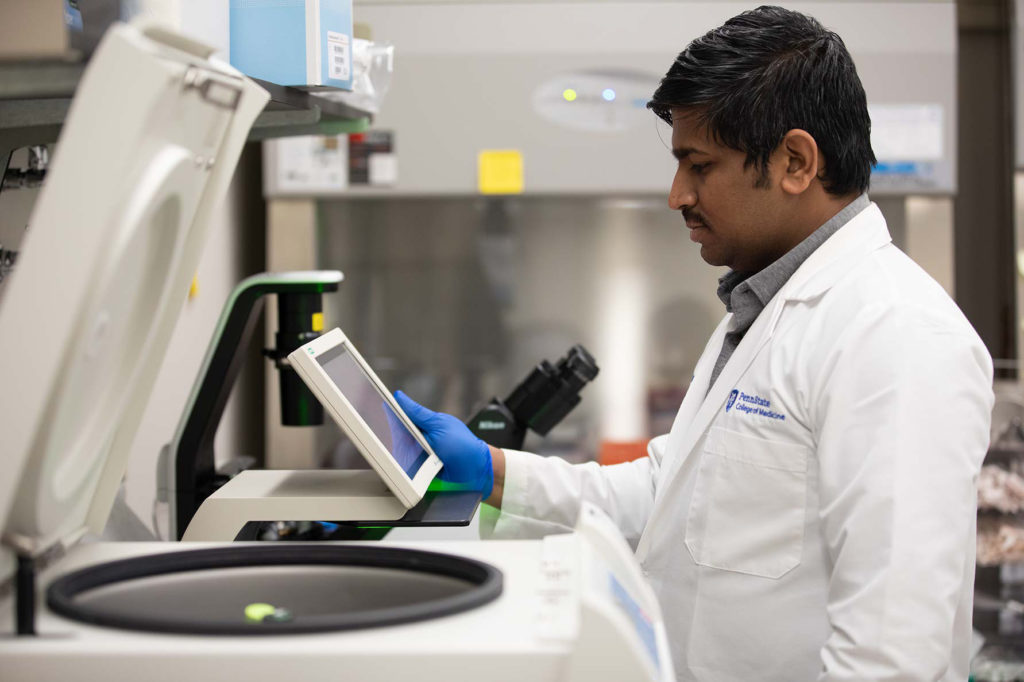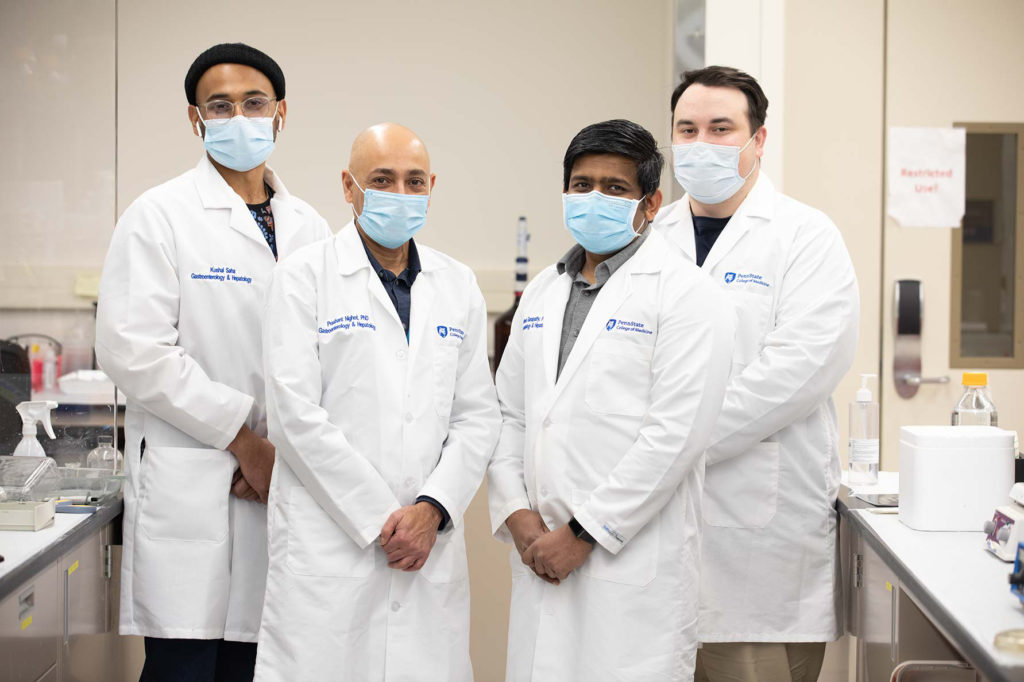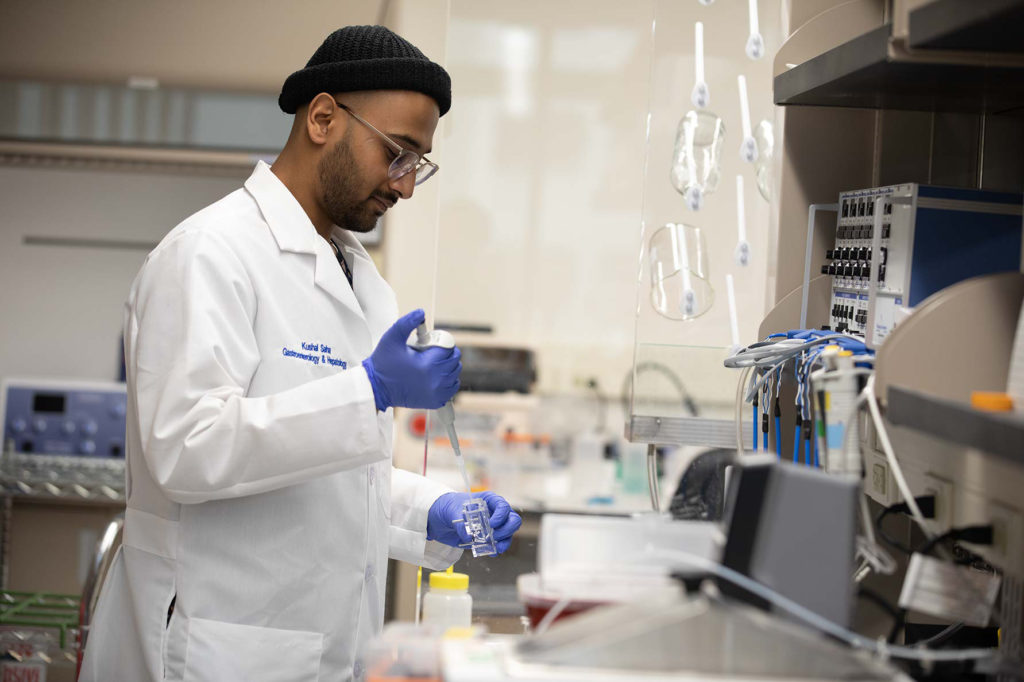Use the buttons below to learn about Dr. Nighot and his team.
About the lab

Dr. Ashwinkumar Subramenium Ganapathy examines cell culture in Dr. Prashant Nighot’s lab.
Recent work has focused on the role of autophagy in TJ barrier regulation. Autophagy, which also means self-eating, is a cell survival mechanism that degrades unnecessary, misfolded and long-lived proteins and organelles and helps cell survive under stress. The lab’s pioneering studies have shown that autophagy enhances TJ barrier via the degradation of pore-forming TJ protein claudin-2.
Dr. Nighot’s lab is also interested in investigating targets to combat IBD using novel intracellular pathways as well as the role of matrix metalloproteinases in intestinal inflammation.
The lab employs in-vivo approaches including several novel mouse models of intestinal inflammation, in-vitro cellular and molecular methods, and advanced imaging techniques to examine their hypotheses.
Jump to topic
Search
Meet the Team

From left, Kushal Saha, Dr. Prashant Nighot, Dr. Ashwinkumar Subramenium Ganapathy and former lab team member Eric Suchanec stand for a group photo in Dr. Nighot’s lab.

Prashant Nighot
Associate Professor of Medicine
Division of Gastroenterology & Hepatology
Associate Professor of Cellular and Molecular Physiology
Dr. Nighot completed his PhD training at North Carolina State University in Raleigh, North Carolina, in 2008 in the area of Comparative Biomedical Sciences. Since then, throughout his post-doctoral training and academic career, Dr. Nighot has studied intestinal mucosal homeostasis in health and disease. After post-doctoral training, Dr. Nighot joined the University of New Mexico School of Medicine as Assistant Professor of Medicine in 2014. In 2018, he joined the Division of Gastroenterology and Hepatology in the Department of Medicine at Penn State College of Medicine as an Associate Professor. Dr. Nighot’s lab is interested especially in the role of defective intestinal tight junction (TJ) barrier in inflammatory bowel disease, including Crohn’s disease and ulcerative colitis. TJ barrier defects allow penetration of luminal antigens, leading to excessive immune and inflammatory response. Dr. Nighot’s projects have been supported by NIH K01 and R01 awards. In collaboration with basic and clinician scientists, the goal of the Nighot lab is to use basic science findings for a better understanding of the pathogenesis of gastrointestinal (GI) diseases and their prevention. The focus of Dr. Nighot’s teaching is GI pathophysiology. He serves as a co-director for the GI medical course and also enjoys teaching in the graduate courses.
Ashwinkumar Subramenium Ganapathy, PhD
Postdoctoral Researcher
Ashwin grew up in India. He earned his master’s degree from the Vellore Institute of Technology University and his PhD in biotechnology from Alagappa University in India. Ashwin has been working at the Penn State College of Medicine since 2018 and has been involved in intestinal tight junction barrier research in Dr. Nighot’s lab.
Kushal Saha, BS, MS
Graduate Research Assistant
Kushal grew up in Kolkata, India, and completed his Bachelor of Science degree in microbiology from St. Xavier’s College (Autonomous), Kolkata, in 2014. He also completed his master’s degree in life sciences with a specialization in cellular and molecular biology from Calcutta University, Kolkata, in 2016. He joined the Biomedical Sciences graduate program in the fall 2018. Since fall 2019, Kushal has conducted his PhD dissertation research in Dr. Nighot’s laboratory, focusing on the immunological and molecular basis for the development and progression of inflammatory bowel disease.
Alex Wang, MS
Research Technologist
Alex was born and raised in Lancaster, Pa. To pursue her interests in animals and science, she earned her bachelor’s degree in pre-professional biology at Delaware Valley University and her master’s degree in biomedical sciences at Thomas Jefferson University. Alex joined Dr. Nighot’s laboratory in 2021.
Research Topics and Current Projects

Kushal Saha, a graduate student in Dr. Prashant Nighot’s lab, works on Ussing Chambers in the lab.
The lab is currently conducting an NIH-funded study investigating the molecular mechanisms of autophagy regulation of TJ barrier and if autophagy-mediated enhancement of TJ barrier can prevent intestinal inflammation.
One of the lab’s ongoing projects studies the role of the aryl hydrocarbon (AhR) pathway in TJ regulation. In a collaborative study, the laboratory is using a novel, non-toxic ligand to activate the AhR pathway to attenuate intestinal inflammation via the enhancement of TJ barrier.
On another project, the lab is investigating the role of matrix metalloproteinases (MMPs) in intestinal inflammation. MMPs play a role in the organization of extracellular matrix and wound repair, but their aberrant expression during inflammation can affect mucosal architecture. Macrophages secrete MMP-12 when activated during the inflammation. The lab has recently demonstrated how MMP-12 enables macrophages to transmigrate through colonic mucosa during colitis and how this process affects colonic TJ barrier and mucosal integrity.
Contact Us
News from Gastroenterology and Hepatology

